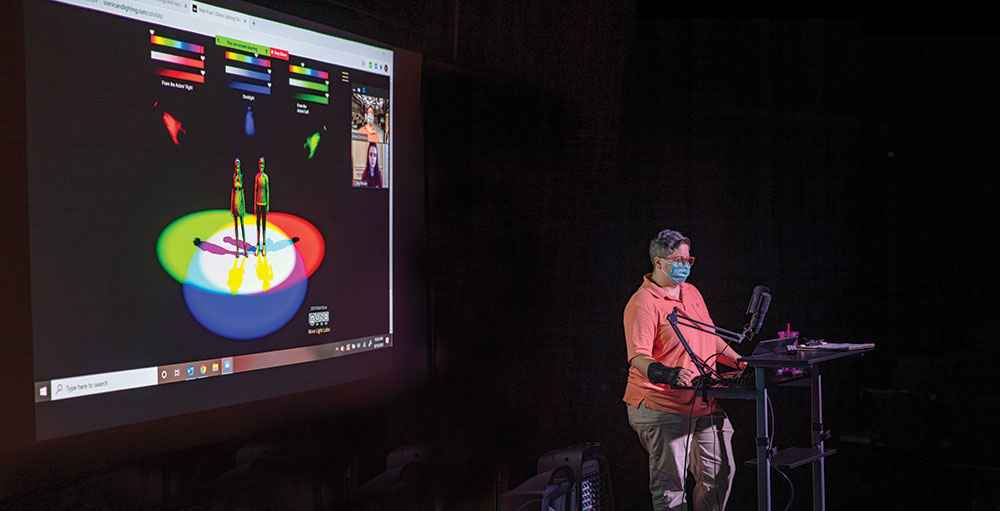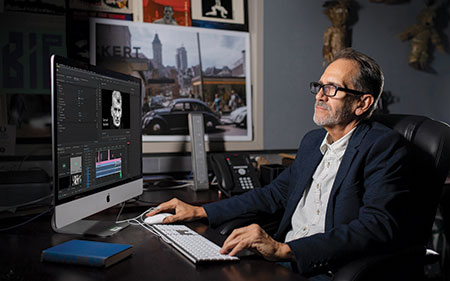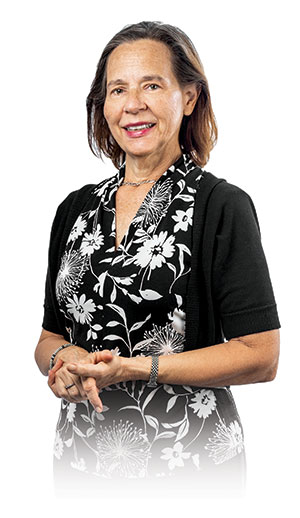From his classroom within the Bower School of Music & the Arts, instructor John Phillips positions the marching band on the field. He sets up the snare drums and the bass drums then adds a cymbals player before moving on to the woodwinds.
When he has the design just right, he adds uniforms with the click of a button. With another click, he animates the band. They step into motion, moving across the football field on his computer screen. Phillips is training the next generation of band directors, and many of his students will go on to lead marching bands across the country. This semester, he’s using an innovative software program called Pyware that allows his students to build elaborate marching band models in the classroom or at home. It’s just one recent example of how Florida Gulf Coast University is meeting the needs of our ever-changing world.

FGCU faculty are tackling the challenges of the post-pandemic classroom head-on. They’re turning to innovative software programs to enhance the in-person classroom experience and, if classes return to virtual learning, they’re prepared to deliver an exceptional education experience online.

“This program makes learning accessible to students off-campus,” Phillips says. “We were able to secure the license for class members to use on their personal computers. In the interest of student safety and security, the course is being delivered online initially.”
In a perfect world, students would collaborate with local high school bands in a hands-on practicum experience. But in COVID times, less exposure is better.
Mary Seal, another Bower School instructor, has seen the benefits of virtual learning software in her piano classes for music majors. The Bower School now uses the eNovativePiano program, which helps students develop strong pianistic techniques. The eNovativePiano system is similar to buying a textbook, only instead of purchasing a book, students buy a subscription for the semester. The subscription includes tutorials that help students apply the many elements required for piano – hand placement, fingering, phrasing, articulation, negotiating the sharps and flats and hitting accurate notes. Students can practice wherever they have access to a piano, whether that’s at home, in their dorm room or in the FGCU keyboard lab (provided they are socially distanced). Students record a video of themselves playing the tutorial and send it to their professor. She’s able to review it and provide feedback, looking for the same criteria she looks for in her in-person sessions.
So far, her students have had little trouble adapting to the eNovativePiano software. “Most students seem fine with me explaining why we’re doing everything this way at this time,” she says. “They’re submitting their video assignments weekly.”
In his theater directing classes at the Bower School, Professor Barry Cavin is also finding unexpected upsides to using software learning programs. He’s currently designing his courses using Canvas, an online learning management system. Though he used Canvas as a supplement to face-to-face classes in the past, the move to online-only classes this summer encouraged him to create his own fully online Canvas course for the first time. “It’s working for my classes in a positive way, even for the performance classes,” he says.
For his directing students, Cavin has created an inventive virtual adaptation of the traditional process. He has students build a scale model of a set and place miniature actors inside. The students then take a photo. For the next moment in the scene, the students rearrange the actors inside the model and take another photo. When they have completed the scene, they assemble the photos and send them to Cavin for critique. “You end up with this stop-motion animation for stage movement and blocking,” Cavin says. “I can see how effectively they’re using the space and how their characters are relating visually.”
“It’s working for my classes in a positive way, even for the performance classes.”
PROFESSOR BARRY CAVIN, ON TEACHING THEATER DIRECTING CLASSES ONLINE

The exercise helps students slow down and examine their choices, he says, and it creates a more deliberate approach to staging. “The hybrid structure carved out a space for my students to submit work in a way that was unconventional but surprisingly useful.”
FGCU senior Madeleine Anderson participated in Cavin’s stop-motion blocking assignment. The theater major created her own to-scale model of a set for Sam Shepard’s “Fool for Love” and used Lego figures for the actors. “I thought it was a great experience,” Anderson says. “I really took it one step at a time, line by line, and blocked out what I wanted.”
In her lighting and sound design classes, Professor Anne Carncross has also seen online learning tools expand opportunities for understanding. “I wanted to make sure that no matter what circumstances my students were presented, they would have access to learning – whether that was an in-person class or an online stay-at-home option.”
She’s using the dance lighting, gobo lab, color lab and cue builder programs under the Matt Kizer: Scenic and Lighting Design software umbrella. The programs mimic the lighting used in the school’s theater and teach her students about color theory, dance lighting and working with gobos (thin metal stencils placed over theater lights to create shadow effects like moonlight filtering through leaves). “Students can go in and play with all of these elements, just as if they were allowed to do it in the theater space,” Carncross says. The program is browser-based, which means students don’t need to download anything on their computers. It’s accessible for both PCs and Macs. “It’s very important to me that all students have easy access,” Carncross says.
Like her fellow creative arts professors at the Bower School, Carncross believes the software-based learning opportunities will ultimately benefit students more than classroom instruction alone. “We can get to so much more than if we were only in the classroom laboratory,” she says. “And we can do it faster.”